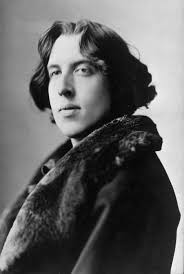The Picture of Dorian Gray Page #4
The Picture of Dorian Gray is a Gothic and philosophical novel by Oscar Wilde, first published complete in the July 1890 issue of Lippincott's Monthly Magazine. Fearing the story was indecent, prior to publication the magazine's editor deleted roughly five hundred words without Wilde's knowledge.
"Basil, this is extraordinary! I must see Dorian Gray." Hallward got up from the seat and walked up and down the garden. After some time he came back. "Harry," he said, "Dorian Gray is to me simply a motive in art. You might see nothing in him. I see everything in him. He is never more present in my work than when no image of him is there. He is a suggestion, as I have said, of a new manner. I find him in the curves of certain lines, in the loveliness and subtleties of certain colours. That is all." "Then why won't you exhibit his portrait?" asked Lord Henry. "Because, without intending it, I have put into it some expression of all this curious artistic idolatry, of which, of course, I have never cared to speak to him. He knows nothing about it. He shall never know anything about it. But the world might guess it, and I will not bare my soul to their shallow prying eyes. My heart shall never be put under their microscope. There is too much of myself in the thing, Harry--too much of myself!" "Poets are not so scrupulous as you are. They know how useful passion is for publication. Nowadays a broken heart will run to many editions." "I hate them for it," cried Hallward. "An artist should create beautiful things, but should put nothing of his own life into them. We live in an age when men treat art as if it were meant to be a form of autobiography. We have lost the abstract sense of beauty. Some day I will show the world what it is; and for that reason the world shall never see my portrait of Dorian Gray." "I think you are wrong, Basil, but I won't argue with you. It is only the intellectually lost who ever argue. Tell me, is Dorian Gray very fond of you?" The painter considered for a few moments. "He likes me," he answered after a pause; "I know he likes me. Of course I flatter him dreadfully. I find a strange pleasure in saying things to him that I know I shall be sorry for having said. As a rule, he is charming to me, and we sit in the studio and talk of a thousand things. Now and then, however, he is horribly thoughtless, and seems to take a real delight in giving me pain. Then I feel, Harry, that I have given away my whole soul to some one who treats it as if it were a flower to put in his coat, a bit of decoration to charm his vanity, an ornament for a summer's day." "Days in summer, Basil, are apt to linger," murmured Lord Henry. "Perhaps you will tire sooner than he will. It is a sad thing to think of, but there is no doubt that genius lasts longer than beauty. That accounts for the fact that we all take such pains to over-educate ourselves. In the wild struggle for existence, we want to have something that endures, and so we fill our minds with rubbish and facts, in the silly hope of keeping our place. The thoroughly well-informed man--that is the modern ideal. And the mind of the thoroughly well-informed man is a dreadful thing. It is like a bric-a-brac shop, all monsters and dust, with everything priced above its proper value. I think you will tire first, all the same. Some day you will look at your friend, and he will seem to you to be a little out of drawing, or you won't like his tone of colour, or something. You will bitterly reproach him in your own heart, and seriously think that he has behaved very badly to you. The next time he calls, you will be perfectly cold and indifferent. It will be a great pity, for it will alter you. What you have told me is quite a romance, a romance of art one might call it, and the worst of having a romance of any kind is that it leaves one so unromantic." "Harry, don't talk like that. As long as I live, the personality of Dorian Gray will dominate me. You can't feel what I feel. You change too often." "Ah, my dear Basil, that is exactly why I can feel it. Those who are faithful know only the trivial side of love: it is the faithless who know love's tragedies." And Lord Henry struck a light on a dainty silver case and began to smoke a cigarette with a self-conscious and satisfied air, as if he had summed up the world in a phrase. There was a rustle of chirruping sparrows in the green lacquer leaves of the ivy, and the blue cloud-shadows chased themselves across the grass like swallows. How pleasant it was in the garden! And how delightful other people's emotions were!--much more delightful than their ideas, it seemed to him. One's own soul, and the passions of one's friends--those were the fascinating things in life. He pictured to himself with silent amusement the tedious luncheon that he had missed by staying so long with Basil Hallward. Had he gone to his aunt's, he would have been sure to have met Lord Goodbody there, and the whole conversation would have been about the feeding of the poor and the necessity for model lodging-houses. Each class would have preached the importance of those virtues, for whose exercise there was no necessity in their own lives. The rich would have spoken on the value of thrift, and the idle grown eloquent over the dignity of labour. It was charming to have escaped all that! As he thought of his aunt, an idea seemed to strike him. He turned to Hallward and said, "My dear fellow, I have just remembered." "Remembered what, Harry?" "Where I heard the name of Dorian Gray." "Where was it?" asked Hallward, with a slight frown. "Don't look so angry, Basil. It was at my aunt, Lady Agatha's. She told me she had discovered a wonderful young man who was going to help her in the East End, and that his name was Dorian Gray. I am bound to state that she never told me he was good-looking. Women have no appreciation of good looks; at least, good women have not. She said that he was very earnest and had a beautiful nature. I at once pictured to myself a creature with spectacles and lank hair, horribly freckled, and tramping about on huge feet. I wish I had known it was your friend."
Translation
Translate and read this book in other languages:
Select another language:
- - Select -
- 简体中文 (Chinese - Simplified)
- 繁體中文 (Chinese - Traditional)
- Español (Spanish)
- Esperanto (Esperanto)
- 日本語 (Japanese)
- Português (Portuguese)
- Deutsch (German)
- العربية (Arabic)
- Français (French)
- Русский (Russian)
- ಕನ್ನಡ (Kannada)
- 한국어 (Korean)
- עברית (Hebrew)
- Gaeilge (Irish)
- Українська (Ukrainian)
- اردو (Urdu)
- Magyar (Hungarian)
- मानक हिन्दी (Hindi)
- Indonesia (Indonesian)
- Italiano (Italian)
- தமிழ் (Tamil)
- Türkçe (Turkish)
- తెలుగు (Telugu)
- ภาษาไทย (Thai)
- Tiếng Việt (Vietnamese)
- Čeština (Czech)
- Polski (Polish)
- Bahasa Indonesia (Indonesian)
- Românește (Romanian)
- Nederlands (Dutch)
- Ελληνικά (Greek)
- Latinum (Latin)
- Svenska (Swedish)
- Dansk (Danish)
- Suomi (Finnish)
- فارسی (Persian)
- ייִדיש (Yiddish)
- հայերեն (Armenian)
- Norsk (Norwegian)
- English (English)
Citation
Use the citation below to add this book to your bibliography:
Style:MLAChicagoAPA
"The Picture of Dorian Gray Books." Literature.com. STANDS4 LLC, 2025. Web. 14 Mar. 2025. <https://www.literature.com/book/the_picture_of_dorian_gray_869>.








Discuss this The Picture of Dorian Gray book with the community:
Report Comment
We're doing our best to make sure our content is useful, accurate and safe.
If by any chance you spot an inappropriate comment while navigating through our website please use this form to let us know, and we'll take care of it shortly.
Attachment
You need to be logged in to favorite.
Log In